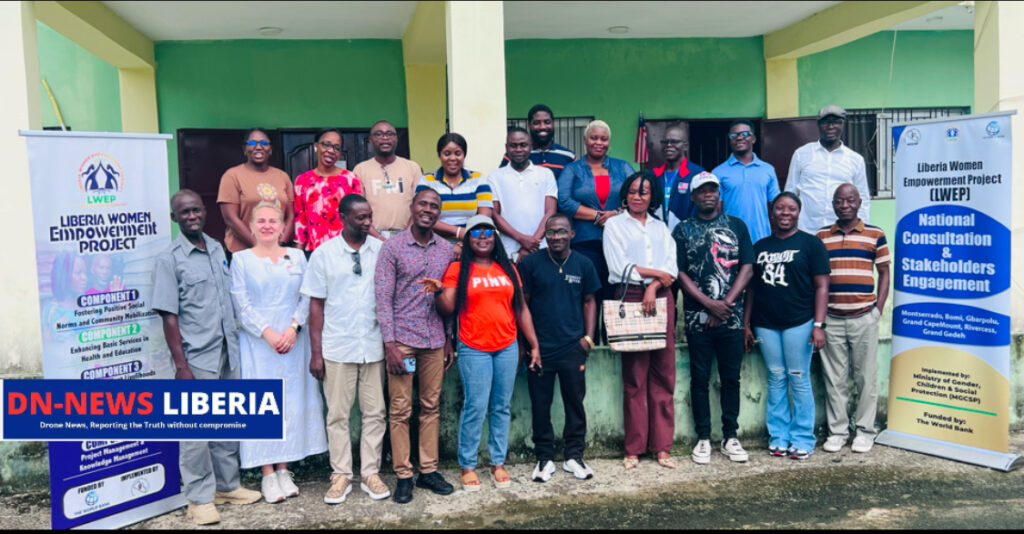Participants at the nine-day training for government employees in Monitoring and Evaluation (M&E) have expressed optimism that the program will help mitigate the challenges they face in gathering sex-disaggregated data to report on gender equality.
This intensive training is held under Component 4 of the Liberia Women Empowerment Project (LWEP), a component focused on strengthening public institutions to ensure gender equality.
The training is being organized by the Ministry of Gender, Children, and Social Protection (MOGCSP) in collaboration with the Liberia Women Empowerment Project, brings together over 200 government employees from multiple line ministries and agencies.
Participants include staff from the Gender Social Inclusion Unit of the Ministry of Agriculture (MOA), MOGCSP, Ministry of National Defense, Ministry of Internal Affairs and Gender coordinators from all fifteen counties.
According to the Organizers, the goal is to equip these civil servants with essential skills in data management, monitoring, and gender analysis to enhance Liberia’s commitment to women’s empowerment and gender equality.
Speaking on the opening day, Agnes Marshall, the Assistant Minister for Research, Planning, and Policy at MOGCSP, emphasized the importance of the training for both institutional and personal growth. She encouraged participants to take full advantage of the opportunity, stating, “This workshop will help identify critical gaps and improve our governance practices. Assessing our performance through effective data gathering will help us meet our objectives and strengthen gender equality initiatives.”
Throughout the nine days, the training will cover key areas of M&E, such as participatory M&E system assessments, developing M&E plans for the Street Children Project, and hands-on monitoring exercises designed to enhance capacity during project implementation.
Additionally, a two-day strategy session on Monitoring, Evaluation, Learning, and Knowledge Management (MELKM) will engage key stakeholders, focusing on county-level data collection and best practices for managing gender-focused information systems.
Participants shared high expectations for the training. Samuel K. Eleyinabah, Director of Research & Statistics at MOGCSP, expressed excitement about the skills he expects to gain, emphasizing that “data is life.” He noted, “This training will enhance my hands-on ability to gather M&E strategies and best practices, ensuring we have accurate data to respond to gender issues effectively.”
Barbara Z. Quere, Gender Officer at the Montserrado Gender Unit, expressed hope that the training would address challenges related to the lack of systems for storing and analyzing data.
“I’m hopeful of gaining more knowledge on M&E systems because we are currently limited in our ability to store and analyze data effectively,” she remarked.
The LWEP’s Component 4 seeks to enhance public institutions’ capacity to collect and manage sex-disaggregated data, which is critical for making informed, data-driven decisions in gender equality programming.
This initiative is part of a broader $44.6 million grant and loan from the International Development Association (IDA) of the World Bank, with a project timeline extending to June 2027.
As part of Liberia’s ARREST Agenda for Inclusive Development, this M&E training aims to lay the groundwork for a robust MELKM strategy that will guide MOGCSP from 2025 to 2027.
This strategy will support systematic assessment, continuous learning, and evidence-based decisions to drive forward gender equality initiatives across Liberia’s government.
Expected outcomes of the training include establishing an operational MELKM system, empowering a network of civil servants skilled in M&E practices, and strengthening MOGCSP’s coordination in advancing gender-focused, data-driven programs.
Through LWEP, Liberia underscores its commitment to creating an inclusive society that supports the empowerment of women and girls, with the Ministry of Gender, Children, and Social Protection expressing gratitude to the World Bank’s IDA for its invaluable support.

